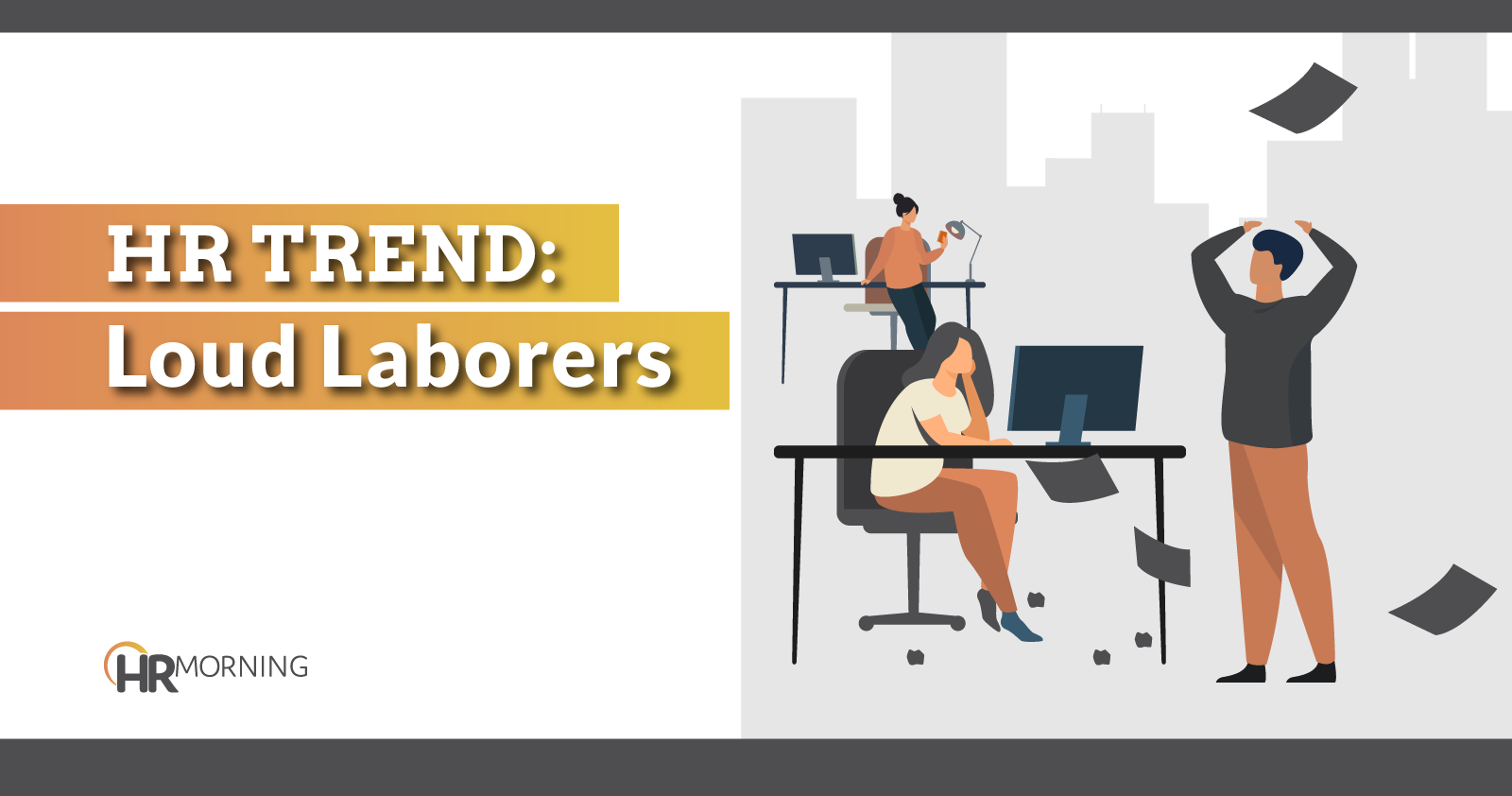Is it noisier than it used to be at work?
Probably — and you can thank Loud Laborers.
More than 75% of employees have worked with a Loud Laborer, according to research from Monster.
But the real problem for HR isn’t the noise. It’s the workplace issues Loud Laborers stir up.
For those who’ve worked with Loud Laborers:
- 63% say it impacts their ability to focus on work
- 54% say it contributes to a toxic environment
- 53% say it negatively impacts culture, and
- 43% say it hurts productivity and morale.
“One loud laborer can significantly negatively impact their colleagues and the environment. This ranges from a decrease in morale and productivity to an uptick in toxicity,” says Vicki Salemi, Career Expert at Monster.
What are Loud Laborers?
First things first: What are Loud Laborers?
“Loud laborers are employees who spend more time talking about their work than actually doing it!” says Joe Galvin, Chief Research Officer at Vistage.
But, to put this into perspective, Galvin says, “While this viral career trend is currently gaining traction on social media, Loud Laborers are nothing new — employees have been reveling for their boss’ attention since the beginning of time. {They} can have catastrophic effects on the workplace, and the company as a whole, due to losses in productivity and negative impacts on employee morale.”
22% of employees would rather work
– A MONSTER STUDY
with their ex than with a Loud Laborer!
It’s more than just another TikTok trend. It has staying power — and longevity doesn’t make the situation any less toxic.
To lessen it, here are five strategies to handle Loud Laborers and lessen their impact on the workplace.
1. Call them out
Nearly half of employees who work with Loud Laborers believe their colleagues have no idea they’re being a pain in the @$$. And the Loud Laborers have no idea how their behavior affects others. (Some probably don’t care, either!)
So that’s why front-line managers want to call out loud behaviors, such as grandstanding, complaining and taking more credit than deserved.
Tip: “Speak to them individually,” says Salemi. “Address the behavior and point out specific situations to the Loud Laborer and provide solutions of alternative ways of behaving.” She adds, “Document these conversations — even if the Loud Laborer is a stellar performer, if their poor behavior continues, that could be grounds for a performance improvement plan to closely monitor their behavior.”
2. Reinforce good behavior
So let’s say you get a Loud Laborer to pipe it down a little. It’s time to call him out again — for better reasons.
As with any performance improvement, front-line managers want to give credit to employees who make the effort to change their tune.
Tip: “As the worker starts (hopefully) improving, positively reinforce it by recognizing and praising them for the adjustment,” says Salemi.
3. Look closer at engagement
Most Loud Laborers are probably not your most engaged employees. They might talk a lot about work, but they aren’t invested in, connected with or committed to their work, colleagues and company. They’re mostly invested in themselves.
But it’s possible to re-engage them.
“To drive engagement, employers need to ensure every employee, regardless of title, is aligned with the organization’s goals and understands how their daily outputs are making an impact outside of company time,” says Galvin.
Tip: Talk one-on-one with Loud Laborers to uncover their unique needs, expectations, motivations and challenges. Line that up with metrics to measure performance and productivity. This can help both of you recognize 1) where you can realistically support the employees’ goals, and 2) where the employees need to focus their efforts if they want to become better employees.
4. Assess differently
Here’s a real issue with Loud Laborers: They make other employees’ experience worse.
“Workplace engagement issues spread through offices like wildfire, as under-engaged or underperforming employees often put an unfair brunt of the workload on their colleagues, ultimately leading to a vicious cycle of burnout,” says Galvin.
Slowly, Loud Laborers become the squeaky wheel, getting all the attention while the people doing the actual work are getting the shaft.
Tip: Assess performance based on tangible results, not the number of hours worked — or presumably worked. “Implementing a robust measurement system with regular checkpoints is essential for identifying those workers who may excel in communication but fall short of delivering tangible results,” says Galvin.
5. Let it go or let them go?
So, do you just take it with a grain of salt, understanding that there will always be complainers and showboaters in the workplace? Or do you get rid of their toxic personalities?
Give it a chance, our two experts say:
Salemi: “There’s still a labor shortage and even though loud laborers tend to draw attention to the fact that they’re working, they may add valuable contributions to the team through their skills and experiences. They may still be a right fit for the organization and just got off course a little bit and need guidance to get back on track. That said, after addressing it with them, and over time, if it still doesn’t improve, then that could be grounds for dismissal.”
Galvin: “People remain the most integral part of the workplace. At the same time, retention has never been more paramount to a company’s ability to succeed. The responsibility is on business leaders and HR teams to curb loud laborers by improving the employee experience … But, in a case where a loud laborer is not willing to pick up their share of the work and continues to negatively impact the work environment as a whole despite attempts to help them become more engaged, it may be time to part ways.”


